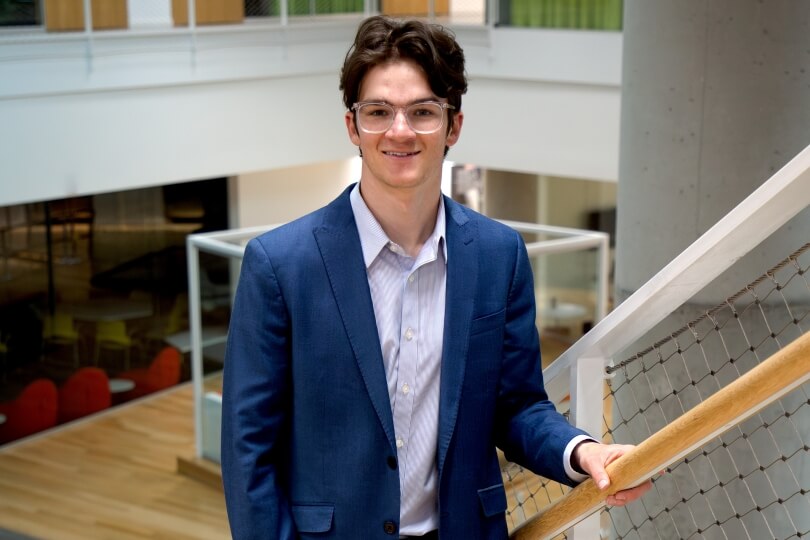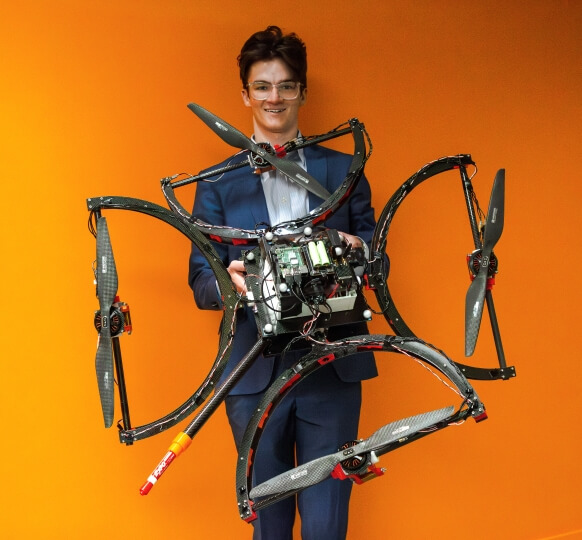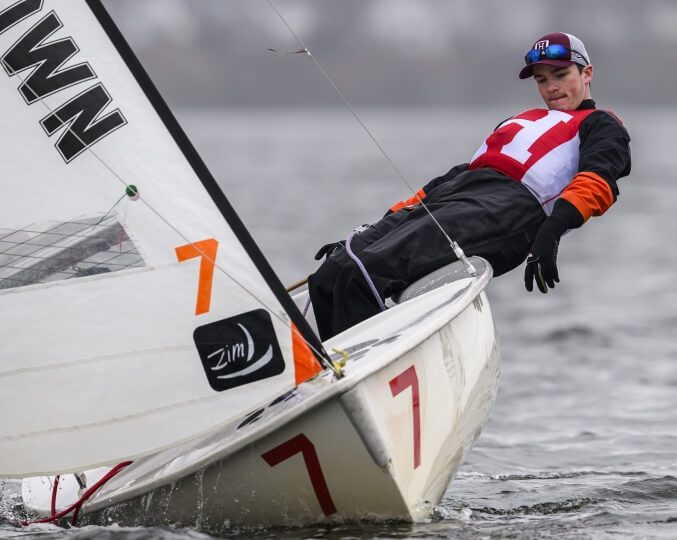Lachlain McGranahan, S.B. '24, in mechanical engineering (Chris Grosse/SEAS)
Imagine you’re on a boat in the middle of the Atlantic ocean, no land in sight. It’s just you, your crew, and an endless canopy of stars above. Suddenly, a pod of dolphins shows up to swim alongside you. How could you not want to protect nature after an experience like that?
“You want to make sure we’re not doing things to eliminate the possibility for future generations to have the same experience,” said Lachlain McGranahan, a fourth-year mechanical engineering concentrator at the Harvard John A. Paulson School of Engineering and Applied Sciences (SEAS).
McGranahan has spent much of the last three years on the water. At SEAS, he’s a drone specialist for Project CETI, an interdisciplinary research initiative that aims to decipher sperm whale communication. On the seas – or the Charles River – he’s a skipper on the Harvard Crimson sailing team, which he helped to win a national championship last year.
McGranahan didn’t know what he wanted to study before coming to Harvard, and the pandemic forced him to take classes from home in his first year. His first semester courses included “Computer Aided Machine Design,” the introductory mechanical engineering class at SEAS that ends with the Turf Wars robotics competition.
“It was honestly one of the best experiences I ever had,” he said. “Even with the Zoom environment of that COVID year, they did an absolutely fantastic job. We’d design things, someone else would machine them and ship them to us, and we could still have a Turf Wars competition. We all set up cameras and competed from our homes at the end of the semester, and that was just an absolutely amazing experience.”
For his senior capstone project, Lachlain McGranahan designed a quadcopter drone with advanced maneuverability to more safely apply tags to a whale’s body (Chris Grosse/SEAS)
Once students were allowed back on campus for his sophomore year, McGranahan sought out new research opportunities. He asked his academic advisor, Robert Wood, Harry Lewis and Marlyn McGrath Professor of Engineering and Applied Sciences, about summer openings in Wood’s Harvard Microrobotics Lab.
“He was nice enough to give me a position working on a microsurgical gripper and laser steering device for endoscopic surgery,” McGranahan said. “I ended up being responsible for some of the material characterization of the layup for the gripping device, which essentially just meant I pulled things off a metal plate for a couple months.”
That first experience opened the door for McGranahan to join Project CETI. Wood is the Robotics Team Lead at Project CETI and his Microrobotics Lab is leading the development of non-invasive soft devices that attach to the whales and record their vocalizations and other data. McGranahan has been working on elements of that for the last three years, including a senior capstone project in which he designed a quadcopter drone that can more safely apply the tags to a whale’s body. His project received a Dean’s Award for Outstanding Engineering Projects.
“We needed performance beyond that of a traditional quadcopter to ensure that we didn’t risk running into or hurting these whales during the autonomous tagging procedure,” he said. “The cool maneuverability you can do with my drone is that you can fly at weird angles or move without tilting. You can align the body of the drone with the curvature of the whale flying at an angle, and that allows you to better increase the tagging success rate, because you’re dropping the tag tangent to the whale’s body.”
Along with his work in the Microrobotics Lab, McGranahan has also spent multiple semesters researching in the Harvard Biodesign Lab of Conor Walsh, Paul A. Maeder Professor of Engineering and Applied Sciences. He also spent a summer working for Imago Rehab, a start-up spun out of technology developed in Walsh’s lab.
Outside of the classroom, senior Lachlain McGranahan is a member of the national-champion Harvard sailing team (Photo by Rob Migliaccio)
Though born in Pittsburgh, McGranahan fell in love with the water as a varsity sailor in Miami, where he won multiple national championships. Along with winning a 2023 collegiate national championship and national runner-up this year, he’s participated in Newport to Bermuda Races, in which sailors travel 635 nautical miles from Rhode Island to Bermuda.
“Especially because of sailing, I’ve always tried to look at things that can have a strong environmental impact or help people,” he said. “All of the work I’ve done at Harvard has been focused on trying to achieve that goal, and I’ve had the chance to be part of some really, really awesome programs.”
McGranahan hopes to continue making an impact with his research after college. He co-founded a start-up, Sidhe Solutions, to further develop his quadcopter drone, and will spend the summer working with MassRobotics to see if it’s commercially viable. While he built the drone for Project CETI, its maneuverability could be advantageous in multiple industries, including offshore wind turbines. These turbines are often damaged due to lightning strikes, and while they have lightning protection systems, testing them is traditionally done by a team roped 300 meters in the air. With one of McGranahan’s drones, the testing could be done with far less human risk, and at lower cost to the company.
If Sidhe Solutions doesn’t work out, McGranahan has a backup plan—he’s been accepted into the Aeronautics and Astronautics master’s program at Stanford University.
“The absolutely best part of Harvard is its flexibility, the opportunities it gives you to try different things,” he said. “Had that not been the case, I’m not sure I would’ve ever found the specific labs or got the chance to do all the things I’ve been able to do. I hope this will be the starting point for something that could have a real impact on renewable energy development. But if not, I still think it was an experience that opened my eyes to what I want to do in the future.”
Press Contact
Matt Goisman | mgoisman@g.harvard.edu


